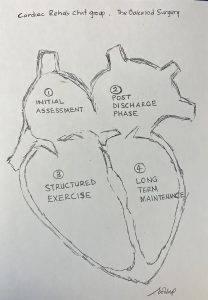
Author - Dr Olusola Olusanya, for The Oakwood Surgery
Have you survived a cardiac event such as a heart attack, heart failure, or a heart not beating in a regular rhythm? Or have you just had a heart operation for valve repairs, a stent, a heart device, or a heart transplant? Even if you are sharing the care for someone whose heart is involved with any mentioned above, then we are most pleased to welcome you to the right page for cardiac rehabilitation.
What is Cardiac Rehab?
Cardiac rehabilitation or rehab, to put it short, is a comprehensive medically supervised recovery program specified for heart diseases, usually after a cardiac event or operation. It is often the case that after the massive support one might have experienced from several teams towards and during hospital admissions, the journey onward from the discharge ward can be overwhelmingly lonely. For most, the feel of abandonment with their heart beating in their chest is only covered with uncertainties, such that 2 out of every 5 patients eligible for cardiac rehab in the UK did not turn up. Often, many patients lapse into physically inactive lifestyles. Cultural and language barriers have been identified as challenges. Other patients have seen heart conditions as a hopeless state which then goes on to have a more crushing impact on their mental health.
But it doesn’t have to be that way. This is where we come in at The Oakwood Surgery, with exceptional family medicine in a first-class surrounding for all the family. With our involvement, you can rest assured that we will walk with you through the practical steps needed towards recovery, following relevant guidelines and policies for necessary referrals to cardiac rehab centers.
Goal of Cardiac Rehab
The goal of cardiac rehab is to improve the quality of your life and make it easier to get back close as possible to an active healthy state. This is achieved with the help of a trained team that consists of doctors, nurses, support workers, and therapists. Cardiac rehab aims to address the underlying causes of cardiac disease that might contribute to the condition in the first place and improve your physical and mental health.
Benefits of Cardiac Rehab
- Through health education, it helps you understand the current state of your heart better and its recovery potential.
- It reduces the chance of worsening symptoms, having another cardiac event, complications, and re-admissions into the hospitals by 18%.
- It generally reduces the chances of death due to heart problems massively by 25%. And to be specific, there’s a reduced risk of death from heart disease by up to 19 in every 100 people who survived a heart attack in similar conditions.
- It’s tailored to your specific heart needs. That’s because it considers how much you can tolerate, and gradually guides you to the expected target for your new normal. For instance, the National Institute for Health Care and Excellence recommends personalised cardiac rehab as early as possible for people with heart failure whose left side of the heart still preserves its pumping function.
- It helps in shedding off unneeded calories and strengthening the heart muscle, which ultimately has a positive outlook on your general health.
Four phases of cardiac rehab
Initial assessment for physical and psychological support
This often comes in the hospital, just before discharge home. It is at this point one’s heart condition would have been discussed, with attempts to clear your mind of misconceptions. Specifically, lifestyle measures to help reverse some contributing or aggravating factors such as poor diet, and smoking would be put in place with the commencement of early mobility. This is a very crucial stage that even if you have missed some of the details or can’t remember them, a discharge letter to your GP would have captured this and a refresher can be done at the surgery, towards heart rehabilitation.
Post discharge phase
After so much support you have enjoyed during admission, it is common to feel lonely after discharge as mentioned earlier. In fact, this phase has proven to be related to anxiety and depression such that medications to help with mental health may have a place. But more than mental health medication, and those for the heart, this is where we best get involved in the community. We bridge this lonely gap and ensure your timely referral to the appropriate cardiac rehab center.
Structured Exercise
You are right to think that this phase is the one called the graded exercise phase. It’s often called by different names and would usually occur at the cardiac rehab centre where you would have gotten an appointment to meet the rehab specialists trained to cater to your heart in its new state. Things to expect are aerobic or outdoor exercises, with some indoor sessions considering every other condition one might have. So, some will have mild exercise intensity, others moderate, and yet others mild to moderate intensity weekly or twice weekly for up to 12 weeks. These graded exercises would range from personalised individual exercises to that in groups. Therefore, many draw strength from meeting and talking to people with similar heart conditions. The aim is to get you ambulant. As a result, personalised targets are set which might include taking a certain number of footsteps every day as tolerated. These can be made easier with step counters such as smartwatches and apps. Relatives and carers come in handy here, and walking pets are not left out. Some people at this point, even get retrained and begin to gain support to get back to their work.
Long term maintenance
To keep the gains of lifestyle changes that would have kicked in at this point, it would be important that they are maintained for a long time. And guess what makes this phase worth looking forward to? It not only helps sustain the relaxed and pumping efficiency of the heart but also strengthens your mental resilience. This is where we come in again to provide that quality that doesn’t leave you floating. Protocols for physical, psychological, and medical reviews would have been in place from your rehab to get you independent. And with the occasional help of the rehab specialists, we at the Oakwood Surgery ensure that the national guidelines are followed in your care.
We are delighted to walk the talk with you through all these steps. Right from getting hold of your discharge letters from the hospital to that from the rehab. Kindly call to book an appointment with us for cardiac rehab assessment if you think you are eligible. And we will certainly be there with you through the referral, enrolment, and follow up in your path to cardiac recovery.

